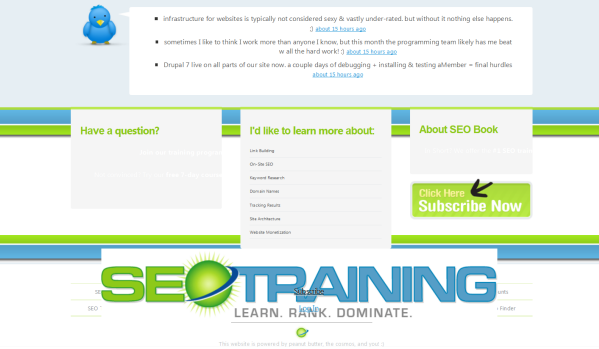In the past I have highlighted how hype-driven hard launches often lead to hard landings. But what is even more challenging than launches is relaunches. Some relaunches are just flicking a switch, done mostly as a marketing gimmick. But those that are real changes are brutal, largely because you have already built up expectations in the past and have to manage expectations, even while everything is changing, and many things are not in your clear control. The more polished you become the worse you look when things go awry. :D
An Error of Confidence
In our member forums while using vBulletin 3 I became confident enough with upgrades that I did them myself even without a programmer standing by. Then I did the vBulletin 4 upgrade and it broke the templates & forced us to create a new design. vBulletin 4 has all sorts of bizarre variables in it and a lot of members were at first put off by the new design that vBulletin forced me into doing. There was almost an emotional visceral reaction amongst some members because we hate change that is forced upon us, especially if it feels arbitrary!
Based on that experience I decided that when we were going to upgrade Drupal and install a new member management software that it made sense for us to pause user accounts in case anything goes wrong. Lots has gone wrong with the update, so that turned out to be a good decision. Although at the same time it means I am spending well into 5 figures a month on upgrades and such while the site is producing no revenues.
I figured the no revenues part would encourage us to be as fast as possible, but Drupal 7 was a far more difficult change than vBulletin 4 was.
Guaranteed Broke

Whenever you do major upgrades will break. And it is virtually impossible to catch it all in advance. There are issues that happen with drop downs on certain browsers only when they are using certain operating systems with certain sized monitor, and all sorts of other technical fun stuff that doesn't appear until thousands of eyes have seen your website.
When you are new and obscure feedback comes in small bits and you keep getting incrementally better. But when everything changes you get hundreds of emails a day and it is nearly impossible to respond to them.
Did You Run Your Site Through a Geocities Generator?
We are trying our best to rush to fix stuff & get up to speed, but some issues that are even fine the day of an upgrade can appear crazy on day #2 due to how things interact. If we had our member's area accessible now, how would we really justify & explain end users seeing something like this...where bizarrely our designs merged:

Weird bugs like that can be difficult to troubleshoot, especially when they are intermittent. We have to fix those huge issues before we can even consider launching (and we mostly have already). But then there are other things that break in other ways that need fixed too.
A Laundry List of Issues
- Post comment permalinks that add 30,000 pages of duplicate content to your site. (mostly fixed)
- Updates that wipe out the ability to reply to a threaded comment on blog posts. (still need to fix)
- Default sign-up page ugly & pretty version not posting to default. (still need to fix)
- Users who desire our autoresponder still not getting it due to needing to test it again before having it send any emails. (still need to fix)
- Integrating on-site social proof of value & activity like recent comments and member information. (still need to fix)
- Redirect issues for certain login types. (mostly fixed)
- Enable multiple product tiers & levels. (still need to fix)
- Cookies issues based on old cookies before the CMS upgraded to the new system. (fixed for those who cleared cookies already, not for those who haven't)
- Password reset emails don't send new passwords, but a one-time login link.
- But some of those login links might be so long that they wrap and are broke by certain email clients.
- Do you build a custom hack to try to fix that directly? or
- Do you wait until you install your membership permissions management software and run everything through that? or
- Do you convert your email module to send HTML emails? HTML emails which then requires a lot more testing because it might get stripped by some email clients. (Or, perhaps the email goes through, but the unsubscribe link is broken, which causes immediately a douchebag freetard to open up a support ticket with "lawsuit pending" as the title.)
That is only a partial list of items...there are literally about 100 more! And, as you can see from that last passwords issue, some corrections lead to additional issues. It is sorta like running up the side of a mountain carrying weights. :)
The challenging part of being a marketer, an SEO, and the guy who interacts with the customers is you deeply know how some things are flawed & that forces you to try to fix them as fast as possible. You can't just ignore the canonicalization issue that would be missed by most webmasters as you know the pain that leads to. :D
Brutal Pain
Even if you are pretty quick at fixing things, some will still blow for a bit. Complex systems are complex.
 Not only will freetards complain, but you will get other forms of legitimate friction simply by virtue of being. Lots of eyes are on your errors. Once you have a well known website there is a lifeflow that goes through it 24 hours a day - if you are there or not. And if any of the common interactive paths are broken you will hear about it again and again and again. And again. :)
Not only will freetards complain, but you will get other forms of legitimate friction simply by virtue of being. Lots of eyes are on your errors. Once you have a well known website there is a lifeflow that goes through it 24 hours a day - if you are there or not. And if any of the common interactive paths are broken you will hear about it again and again and again. And again. :)
And yet, while you are trying to decide the best way to keep making things better you get emails that are condescendingly friendly. ;)
You guys have some very useful tools on this site and provide very useful seo information. Yet your site's user flow is surprisingly confounding and awkward. You guys strike me as practical internet marketers and I can't help but wonder why, if you were to upgrade anything on your site, you wouldn't have addressed your awkward user flow as opposed to spending time and money on some hipster faux web 2.0 window dressing. I know I'm not a paying customer...but I've always used this site for the keyword search tool and it has helped me drive traffic and increase eCPMs on my sites.
...
My guess is the type of people who use your site are not impressed by silly, day-glow,pastel makeovers and are more interested in useful seo data and information.
Nice. So they use us, make money from our work while paying us nothing, and yet they need to sling insults towards us while we publicly state that we are doing upgrades. Way to be a winner! If only everyone in the world was like them this site would disappear.
And they are completely wrong in suggesting that aesthetic doesn't matter. You can't quantify the losses without testing a different approach, but companies do not sink billions of Dollars into testing CPG packaging just for the fun of it. At a minimum a better looking site will increase trust. That leads to all sorts of other things like:
- better perceived quality
- lower perceived risk
- higher conversion rates
- being able to charge higher rates
- higher visitor value
- more media exposure
In many industries the winner is not who is well known within the industry, but rather who is safe and easy for outsiders to reference. Design is important for the same reason that domain names are. Either can yield an instance sense of credibility when done well & either can quickly take it away when done poorly.
And people who are new to an industry become the experts of tomorrow, so if they trust you more off the start then you build a self-reinforcing marketing channel. Whereas if you are not trusted you have to convince people to switch away from defaults after they already made their choice. And that is hard to do if they already passed you over once & your website is ugly.
And there is also the blunt straight talk feedback: "Your Products are bullshit."
I actually prefer the latter to the former because they don't insult your intellect by wrapping the insults in a passive-aggressive flowery packaging. (OK so I said a nice thing about him, so now I can REALLY insult him!!!)
Expecting Friction

One of the online issues that I think is rarely talked about is the issue of user friction. Media plays up the benefits of success but rarely highlights the cost of it. A popular game developer launched a hugely successful game at 99 cents & was devastated by his success:
I’m angry at a small percentage of customers who actively work towards harming its success. I’m angry at the customers who send me nasty emails or reviews, threatening me with ‘telling Apple to remove it’ or rating it 1 star with a ’should be cheaper than free’ remark because after paying the ridiculously exorbitant 99c, they found it didn’t live up to expectations. The absolute worst is users who condescendingly ‘try to help’ by outlining every little thing they think is wrong with it.
...
The anger, the sense of entitlement, and the overriding theme that I owe them something for daring to take up any of their time is sickening.
...
I can see now why many companies provide rubbish support, and have a ‘give us your money then piss off’ attitude. They have no doubt learned the hard way how soul destroying taking pride in your products can be.
That is a big part of the reason I abandoned the ebook business model. I felt that if I kept the model much longer I was going to have to sacrifice the quality of the customer interaction & be more like the companies I grew to hate. Rather than living that way we move higher up and get a higher quality of customer. Another benefit of our current (or soon to be restored) model is that if people ask questions in a closed garden social setting almost nobody is comfortable acting like a troll. People generally won't write the stuff in a social setting that they would write in an email, especially if they are not fully anonymous and they know doing so is going to make them look like a jerk.
While we still have tons of things to fix, the first things we fixed were related to duplicate content (to simply avoid the pain) and some issues associated with the registration path. The ones that people are going to complain about most are generally the ones you need to fix first, because that ends up saving you time in the longrun.
But if you price too cheaply (but not at free) then it is hard to ignore any of the feedback, even when it is ugly. This is why you are better off having higher prices & only converting a small portion of your audience. The folks from MagneticCat left a good comment on the above blog post:
$0.99 is an unsustainable price point. Because, if you sell 1 million games, you make $700,000 BEFORE taxes. A nice amount of money, but you also get 1 million customers – the amount of people living in a huge city – that could potentially have some problems with your game. Maybe because their iPhone’s accelerometer is broken, or because their headphone jack is not working anymore, or because there is an actual bug in your game.
We are only at about a half-million registered users & it is hard (20+ hour work days) to keep up when anything breaks. I can't imagine what it would be like to have a million PAYING customers. I think I would be sitting in the fetal position somewhere. ;)
That said, I am excited to get our site re-launched again and miss the daily water cooler nature of our forums. And based on the emails I am getting every day, so do many of our customers. Sorry for the delay guys!
Status Update
We have Drupal 7 installed on both parts of the site. We have 3 days of bug fixing left and testing our membership software (which will also take a couple days). We may try to do some of it concurrently & test our membership software Sunday or Monday & hope to have a recurring test & a cancellation test done by Tuesday evening for a soft launch to past subscribers. If that goes well then we would hope to do a full launch before the end of next week.


